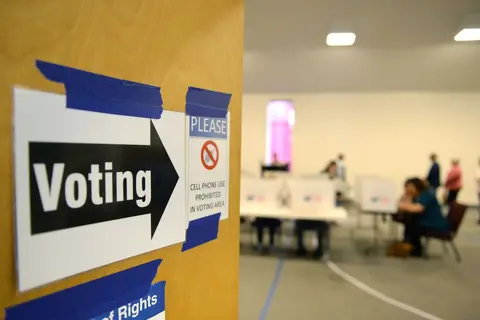
This letter features reporting from "The Many Varieties of Voter Suppression" by Brittany Gibson
Dear Senator Wicker,
Racial injustices have become very prevalent in modern times with the tragic death of George Floyd rocking our nation to its core. Racial discrimination persists throughout America in every aspect of life, and one way in which minorities are discriminated against has just recently been put under the spotlight. With the 2020 presidential election being of such paramount importance, the fairness of this election and others has been called into question. An article by Brittany Gibson for The American Prospect and the Pulitzer Center titled "The Many Varieties of Voter Suppression" thoroughly explained obscure voter eligibility laws in places across the country such as Georgia, Alabama, and Florida. Whether it be changing voting locations, limited voting periods, or changing requirements for paperwork to be eligible to vote, voter eligibility laws are poorly communicated to the public, and until recently the motive for such actions could only be speculated. This article, however, brought to light a study by ACLU of Florida, which found that ballots filled out by younger and, most importantly, minority voters, were being tossed out at a higher rate than other ballots. This study exposes the fact that the dubious nature of voter eligibility laws is due to the evil motive of racial discrimination.
The article briefly touches on the issue of racism in the voting systems we have implemented today, and it is important to amplify this message in a place like Mississippi. Voter suppression rooted in racism has long been a widespread issue in Mississippi. From the times of slavery up until the attempted total abolishment of Jim Crow laws in the Voting Rights Act of 1965, voter suppression was at its very worst, and remnants of this dark era remain today. Mississippi currently has an electoral college-like voting system for the governor election, which was designed by white farmers during the Jim Crow Era with the goal of positioning minority voters into one voting group in order to minimize their voices in the election. Mississippi is the only state with an electoral college system to elect a governor. The purpose of an election is to elect an official who represents the people they are leading, and while a case can be made for the legitimacy of the electoral college on a national level, there is no reason that an already localized position such as the governor should be elected by an electoral college system. Partially as a result of this discriminatory system, Mississippi has never elected a Black candidate to governor, despite Mississippi having the largest proportion of Black population of any state at 40%. Having never been effectively represented at the top level of government, minorities in Mississippi have been met with abhorrent obstacles when attempting to make any sort of change; this is one of the reasons why it took so long to supplant the confederate-themed flag with a newer design. The suppression of minority votes in Mississippi, specifically by confining minority votes to one electoral area, has had numerous detrimental effects on the quality of life for minorities in Mississippi. Policies that trace back to the Jim Crow Era have no place in a state as diverse as Mississippi.
Senator Wicker, I’m writing to you because I believe that everyone deserves equal representation in our elections. However, the current electoral system denies minorities this basic right. As this article shows, states around the country suffer from voter suppression, and in specific cases, this is rooted in racism. Mississippi is also affected by voter suppression, most apparently by the electoral college-like system from the Jim Crow Era. Mississippi's best option to end this morally-repugnant practice is to abolish the electoral college-like system for electing statewide officials such as governors. Terminating this process of election to adopt a system similar to every other state is crucial to minimize voter suppression and lingering forms of legislative racism. Using a federal mandate to change this system would be the quickest and most efficient way to achieve this goal due to Mississippi’s historic reluctance to make changes in this area by ourselves. Congress officially ended Jim Crow laws with the Civil Rights Act of 1964 and the Voting Rights Act of 1965, so with your support, Senator, it seems fitting that Congress should finish the fight they began all those years ago.
Sincerely,
Patten Lane

Patten Lane is a sophomore at St. Andrew's Episcopal School in Ridgeland, Mississippi who has also always had an avid passion for writing. He is on the lacrosse team and the debate team at his school, and when he is not participating in these activities Patten loves educating himself on current world events.
Read more winning entries from the 2020 Local Letters for Global Change contest!